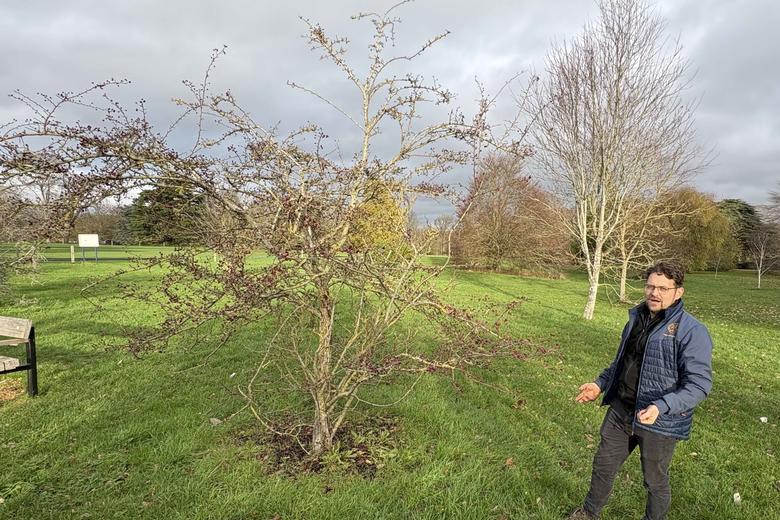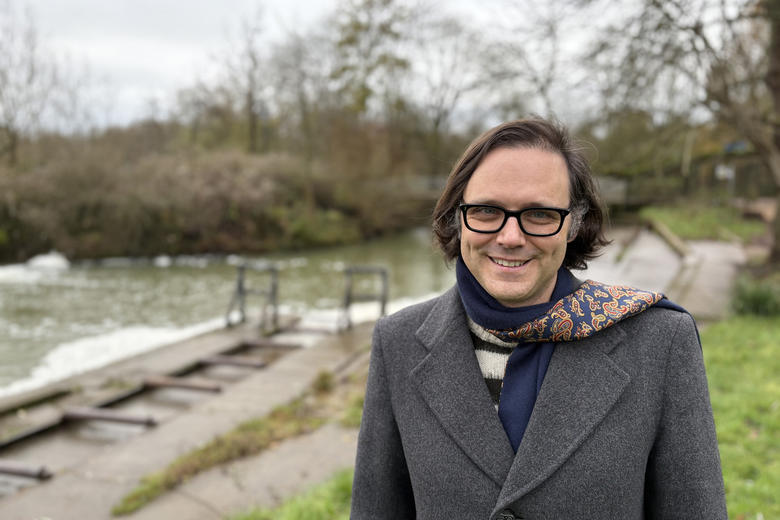MAIRI GIBBS

MAIRI GIBBS
The CEO of Oxford University Innovation discusses her role and her ambitions
Published: 11 February 2025
Author: Richard Lofthouse
Share this article
Oxford University Innovation (OUI) is Oxford's in-house tech transfer unit and the first port of call for any academic who thinks they might have a brilliant idea - potential intellectual property - or expertise with commercial promise.
Studying chemistry originally at New College (New College, 1991), Dr Mairi Gibbs knows the University inside out and was made CEO of OUI in June 2024.
She is keenly aware of her famous predecessor chemist up the road at Somerville - Margaret Thatcher (Somerville, 1943), an obvious opening remark when we meet in late January at OUI's offices down the Botley Road.
Mairi says, 'the Thatcher government enacted a change in the law to give universities ownership of IP developed through research council funding. Without this, OUI and UK university tech transfer more broadly would not exist in the same way'.
Perhaps with the Iron Lady in mind, she adds that the big thing about Oxford University over the past decade is how entrepreneurship has become central to its whole culture, like a liquid soaking a fabric, not only at the level of dons in labs but right down to the undergraduate level.
'Less Alan Sugar 'rags to riches,'' Gibbs says, 'than groundbreaking intellectual property that must be commercialised if it is to have meaningful impact at scale.'
Entrepreneurship is a mindset that, when you consider it briefly, defines all students and academics to some extent. Self-starters, often out on a limb, foregoing a salary for an intellectual purpose, the risk premium hopefully repaid as a great career, or, increasingly, as a start-up intent on really changing a field or commercial sector.
One of the celebrations of 2024 was that the student-founded company called Onfido, launched by Eamon Jubbawy, Ruhul Amin and Husayn Kassai, all formerly at Oxford's Saïd Business School, was bought by global online security company Entrust Corp.
Onfido was supported by OUI's Incubator when it was still new back in 2012. The sale to Entrust, says Mairi, produced a significant return to the University that will be reinvested straight back into the incubator to benefit other enterprises.
Onfido developed a digital identity platform powered by AI, believed to have saved billions in fraudulent online transactions, a huge contribution.
Another significant recent headline was a new drug discovery and development collaboration agreement between the University and biopharmaceutical company Apollo Therapeutics, designed to accelerate the commercialisation of Oxford's biomedical research.
In still another, huge landmark, the first deliveries of Oxford's R21/ Matrix-M malaria vaccine in Africa reflected the success of another medical licensing deal which the OUI team negotiated with the Serum Institute of India.
So important is this culture of successful innovation that it underpins the University's strategy led by Vice-Chancellor Professor Irene Tracey, and has already been strongly endorsed by Oxford's new Chancellor, The Lord Hague of Richmond, William Hague.
The Iron Lady would be happy to know that her education policy record, greeted at the time with notorious dismay by Oxford's dons, nonetheless seeded a much broader culture of getting things done and having an impact.
'Maximising the global impact of Oxford's research and expertise' is OUI's explicitly-stated goal, says Mairi - a huge job manifested by a significant office structure and 95 employees at the time of writing, many of them licensing and IP specialists, some of them managing consultantcy arrangements or investments.
Subjectively, as I am given a whistlestop tour of the OUI's office, the whole enterprise hums with intent and could be framed as the serious, slightly out of sight engine room driving Oxford's global impact, perhaps conceptually in perpetual balance with the Hogwarts Oxford shop window so beloved of tourists and other visitors.
According to a 2024 survey, Gibbs says, there are over 900 million people in the world who are currently users of products and services that originated in Oxford University.
In the year to July 2024 OUI raised £872.1 million in investment, executed 689 consultancy contracts and completed 1,239 licensing deals.
Aside from these raw metrics, everything has been done in a manner designed to preserve academic freedoms and to benefit the communities that live in Oxford, to make sure that economic growth is inclusive growth, embedded within a broader vision for the city and county, and aligned with the UN strategic development goals (SDGs) which are measured against each enterprise.
A few days after our meeting, Chancellor of the Exchequer Rachel Reeves (New College, 1997) made a surprise visit to Oxfordshire to deliver a significant speech outlining her plans to stimulate economic growth, the headline initiative to reignite the Oxford-Cambridge corridor. She argued that if managed correctly with enhanced infrastructure including housing and better transport links, this broad region could contribute £78 billion to the UK economy by 2035.
Central to the argument are the universities in both cities, which in a broader reading connect with London to form a 'golden triangle'.
Within our earlier discussion and anticipating my next question, however, Mairi diplomatically notes that OUI has had to mobilise as much funding capital as it can muster to supplement public markets that have badly sagged in recent years, to the point where stock market listings have been tending to migrate towards the US, where there is deeper liquidity.
OUI offers seed funding via Oxford's University Challenge Seed Fund. That will typically be anything between £50 and 250k, within an agreed timetable enough to push the idea further. In collaboration with LSE and ten other universities, a programme called Impact 12 provides support specifically for social enterprise formation.
Fledgling companies, by then often with a dedicated manager alongside an early career researcher (allowing the senior academic in question to stay in the lab or the library), can then turn to other funding sources. These include OUI's immediate partner and venture builder Oxford Science Enterprises (only OUI is fully owned by the University), third-party venture capitalists, private individuals known as angels, and Parkwalk Investment, a subsidiary of the publicly-owned IP Group that now manages six dedicated Oxford University Innovation Funds (OUIF I- IV, 2014-23).
The latter have typically been funded partly by Oxford alumni, eager to put their money against a potentially world-beating technology, support the home side; maybe do well out of it over a decade, or lose their money in what everybody recognises to be a high-risk sector.
If ventures survive their initial years and grow, there is another bit of funding managed by OUI that swings into action, Oxford Spinout Equity Management fund (OSEM), which as part of its overall portfolio management strategy puts approximately £4 million towards later-stage spin-outs in a typical year.
'That's a very careful process,' Gibbs emphasises, adding that the money might be arranged across 6 to 12 companies, typically where a path to broader success can be plotted with a reasonable degree of certainty in an uncertain world.
Despite all these efforts the broader investment environment, so important, is currently underperforming in the UK, a view echoed by Mairi's counterpart at OSE, Ed Bussey. The solution that is now beginning to materialise will be government reforms that will shake up the pension industry and allow them to take a greater degree of investment in private companies, some of them no doubt comprising university spin-outs.
To actively create a better investment environment, OUI has led several recent partnerships and events, out to the US, and in front of the world's largest family offices and venture funds, to sell Oxford's innovation abroad.
Standing up such efforts are a wonderful range of investable companies with particular strengths in deep tech and medicine technology, ranging from Mixergy, which has pioneered machine learning solutions to power homes, saving carbon and bills, to Brainomix, which is revolutionising stroke care through AI.
Others include Organox, which has developed its Metra device for liver transplant, in use in the NHS and overseas, Oxehealth, which deploys its contactless patient monitoring platform in mental health hospitals, supporting staff to keep patients safe and Covatic, which enables private-by-design advertising while protecting personal data.
I get to stand at the doorway to the licensing floor. Here, in front of banks of screens, are licensing and IP specialists many of them doctorates or post-doctorates in their own name. What they do is, I am told, a fascinating game of chess, being not only hugely specialised but which can easily become fraught. Who invented what, when: how does the equity get spread around.
But around this intense individual ambition to make an impact are equally intense efforts being made by OUI to increase the share of women in OUI commercialisation activities, up from 29.8 to 39.5% between 2015 and 2023, and also to benefit the local community in concrete ways - such as Greater Change, another student-founded enterprise begun in 2018 by Alex McCallion and Jonathan Tan to raise targeted funding to assist homeless people in moving out of homelessness.
It's a mission as broad as it is deep, the 2024 Beauhurst Spotlight on Spinouts report reaffirming Oxford's leading position in generating spinout companies in the UK, 210 since 2011 maintaining its status as the top academic institution for such ventures.
Mairi says, 'At Oxford University Innovation we're committed to turning cutting-edge research and expertise into practical solutions for the challenges and opportunities of our time. We support innovators from all parts of the University, and are increasingly seeing Oxford's spinout companies mature into businesses that are making a real difference towards a better future, creating lasting economic, societal, and environmental impacts in a really exciting innovation ecosystem here in Oxfordshire'.
Oxford University Innovation: www.innovation.ox.ac.uk















